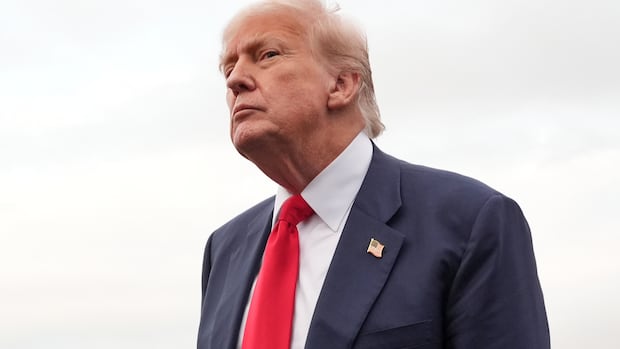Prime Minister Mark Carney said Monday trade negotiations with the U.S. are at an “intense phase” ahead of Friday’s deadline to reach an agreement.
“[Canadians] don’t deserve the uncertainty that’s been thrust upon them… they want the right kind of resolution. They want a deal that makes sense for Canada,” Carney said during a news conference in Prince County, P.E.I.
“The negotiations are at an intense phase, it’s a complex negotiation.”
Carney’s comments come after U.S. President Donald Trump mused last week that a deal with Canada might not be in the cards.
“We haven’t really had a lot of luck with Canada,” Trump told reporters Friday outside the White House in response to a question about the state of tariff talks with U.S. trading partners.
“I think Canada could be one where there’s just a tariff, not really a negotiation.”
As U.S. President Donald Trump says he hasn’t ‘really had a lot of luck’ negotiating a trade deal with Canada so he may just impose a 35 per cent tariff on non-CUSMA-compliant Canadian goods on Aug. 1, the Power & Politics panel of party insiders discusses what the comments mean for Prime Minister Mark Carney and Canada’s economic outlook.
The two countries have been negotiating to reach some sort of trade agreement by Friday. The talks come after Trump imposed tariffs on a number of Canadian goods and he has promised more could come by the deadline.
The president wrote to Carney earlier this month, threatening to slap a 35 per cent tariff on goods that don’t comply with the Canada-U.S.-Mexico Agreement (CUSMA).
That rate would apply to Canadian exports currently being tariffed at 25 per cent, under Trump’s emergency powers, citing what he says is a national security threat from fentanyl trafficking.
Separately, Canadian steel and aluminum are facing a 50 per cent tariff that the U.S. has imposed on all countries, while the U.S. tariff on Canadian energy and potash is set at 10 per cent. Trump has also slapped a 25 per cent tariff on non-U.S. content of automobile imports and threatened to impose levies on pharmaceuticals, lumber and copper.
During a visit to Washington last week, Canada’s top trade negotiators downplayed the likelihood they’ll get an agreement by Friday.
“We’re going to continue to work toward the Aug. 1 deadline,” said Canada-U.S. Trade Minister Dominic LeBlanc. “But all of these deadlines are with the understanding that we’ll take the time necessary to get the best deal that we think is in the interest of the Canadian economy and Canadian workers.”
Although U.S. President Donald Trump’s Aug. 1 deadline is fast approaching, there is no sign of a breakthrough yet on a new Canada-U.S. trade deal after a week of talks in Washington, D.C. Ottawa continues to say it won’t sign anything that isn’t in Canada’s best interest.
Despite Trump’s comments last week, Carney still expressed optimism that a deal could be reached by Friday.
“They’re tough negotiations, as they should be. We’re standing up for Canada, for Canadian interests,” he said Monday.
“There is a landing zone that’s possible but we have to get there. We’ll see what happens.”
The U.S. president has been using tariffs and tariff threats to push for trade agreements with a number of countries.
The EU was the latest U.S. trading partner to reach an agreement. The European bloc reached a deal that would see the U.S. impose a 15 per cent tariff on its imports — half of the 30 per cent that Trump had initially threatened.
Carney has said in recent weeks that an agreement with the Americans may include accepting some levies on exports.
But the prime minister suggested on Monday that Canada is in a better position than other U.S. trading partners because the Americans rely on certain Canadian exports, specifically energy.
“The United States and Canada can do many good things together. We have done that in the past, we can do more in the future but on fair terms for our country,” Carney said.






